$50,000 Encore Career Prize, 2015
Russ Perlich – 2015 Encore Career Prize Recipient
“Do what you need to do so that someday, you can do what you want to do. This is what I want to do.”
–Russ Perlich, Act One Founder
By Jennifer Dokes
Jennifer Dokes, founder of JDD Specialties LLC, is a former longtime member of The Arizona Republic editorial board.
Russ Perlich is in a prime spot at a live performance he has seen many times during the past few years. His favorite part is coming up, and, as always, he’s immersed in the hit production. It never gets old.
The special moment comes when the theater is empty, cast members are backstage and ushers await the nearly sold-out crowd. The play starts in 30 minutes, but for Perlich and his supporting cast, it’s already showtime.
Act One, the nonprofit Perlich, a retired CEO, and his wife, Linda (“Mac”), founded in 2011, has done everything necessary to get 500 students from underserved schools to the grandeur of a performance hall. It purchased tickets and arranged bus transportation, and it provided education materials to help children get the most from the experience. Act One has done this dozens of times for more than 75,000 Arizona students.
The performance center’s doors open. Here it comes. The moment. “Wow.”
You hear it as excited students stride through the stunning lobby and take their seats in a gorgeous theater. You see it in bright eyes that open a little wider to another world. Life-enriching seeds of transformation are planted and the play hasn’t even begun.

For many of these children, the Act One field trip is their first exposure to a live, high-quality performance. They all come from Title I public schools—those with a high percentage of students who live in low-income families. Circumstances are such at school and home that it may be a while before they get a similar arts experience. That’s simply their reality.
Perlich, through Act One, is determined to change the narrative. The longtime patron of the arts acts on the belief that it’s a different story for these kids and society when there is equitable access to creative nourishment.
Nailing the “Wow” moment is central to leaving a lasting impression and more. Studies show relevant, meaningful arts experiences have a tremendous impact on a child’s academic performance, social skills, and self-esteem. The awestruck “Wow” is a mechanism for achieving the self-empowering “What if.”
What if, the Perlichs wondered, all Arizona children were provided meaningful arts experiences that enhance their academic and creative potential? To address gross inequity in public education, they created Act One with proceeds from the sale of Russ’ business.
“We’re hopefully building creativity,” Perlich said. “We’re hopefully building curiosity. We’re hopefully building a what-if mindset: ‘If there are people on that stage doing something I’ve never seen before, what else is there? What if I was to do that? What if I could be part of something like that?’ ”
Seeds for Act One were planted 50 years ago in Russ’ arts-enriched public school education. They laid dormant until several years ago when the Perlichs were shocked to learn that Arizona students, particularly from underserved campuses, rarely, if ever, attend field trips. Years of budget cuts to education had pushed arts and culture adventures off school priority lists.
In Title I schools, at least 40 percent of the students qualify for free and reduced-price lunches. These schools focus, understandably, on more basic necessities than field trips—for example, ensuring hunger is addressed for students. Meanwhile, students on campuses serving higher-income neighborhoods typically have means and opportunity through school or home to benefit from attending high-quality arts performances.
What if, the Perlichs wondered, all Arizona children were provided meaningful arts experiences that enhance their academic and creative potential? To address gross inequity in public education, they created Act One with seed money from the sale of Russ’ business.
As a student in Minnesota public schools, Russ, regularly attended arts-related field trips. He distinctly remembers a performance of the Minnesota Orchestra. It was his first formal introduction to classical music and the start of a lifelong passion.
Listening to the low-key Perlich, a man who shuns the spotlight, it’s hard to imagine him ever exclaiming, “Wow,” not even as an excited youngster on a field trip. But decades later he talks about the impact of that experience and classical music. The symphony field trip is a note in the song of a long professional career and a rich family life that includes three daughters.
Reyna Rivera, a recent Arizona State University graduate now studying for a master’s degree in applied behavioral analysis, was among the first students to attend an Act One field trip. Her “Wow” moment was more like, “Oh, my goodness.”
“It was breathtaking,” Rivera said. “They have this structure walking into the Herberger. I remember looking up and it looked like water droplets. … There were students everywhere, but for that single moment, it felt like it was just me. … It was extraordinary.”
Rivera said she is certain she wouldn’t have experienced live theater without Act One. She traces some of her academic success and personal satisfaction to seeing those performances.
“My mom was working two jobs and she did try to expose me to literature early on,” Rivera said. “However, attending a theater performance was not feasible for her at the time. Act One provided that opportunity for several of us who had never even thought it was possible for us to attend.”
In 2012, Act One arranged for about 100 students from Maryvale High School to see a production of “The Great Gatsby.” Teacher Dixie Maxwell said that field trip, the instructional materials provided to students and teachers, and all the Act One-sponsored performances every year since have been “like a blessing from heaven.”
“This was the most wonderful miracle that had ever happened to me as a teacher, and I have taught for 42 years,” Maxwell said.
Answers to a lifetime of “What if” questions helped Perlich get to his prime spot in life and in the nonprofit world.
Shortly after earning a business degree from the University of Arizona, Perlich pursued the possibility of establishing a branch of the manufacturing business his family owned in Minnesota. He thought there was a market for the same products in Arizona. There wasn’t. But that period of discovery — of getting square with reality while imagining new possibilities — led in 1975 to Quadna, a custom engineering and manufacturing firm Perlich started from his home in Tucson.
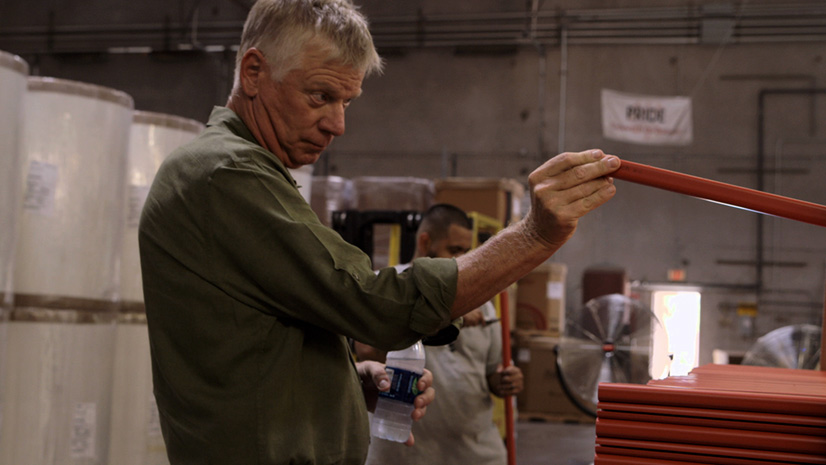
Perlich’s company initially worked exclusively with the mining industry. It evolved constantly but slowly into a business creating fluid handling systems to meet a variety of needs for a multitude of industrial and municipal applications. Under Perlich’s leadership, Quadna expanded to locations in several states and Mexico; it had customers around the world and had grown to $60 million in top-line revenues.
When he sold Quadna in 2010, Perlich had plans for days filled with nothing but golf. He had no idea that creating “Wow” moments would be such an integral part of retirement.
When he sold Quadna in 2010, Perlich had plans for days filled with nothing but golf. He had no idea that creating “Wow” moments would be such an integral part of retirement.
“If I could define loosely his business personality, he was a driver,” said Al Priem, Perlich’s longtime business associate, who now serves as board chairman of Act One. “He was goal orientated and very much driven to accomplish his goals. He would lay out the aspirations and goals of the company to more senior management and the expectations in a certain time to accomplish them.”
That hasn’t changed in his transition to the nonprofit world.
“In order to plan where you’re going, you’ve got to know where you are,” Perlich said. “So, what’s the trend? What’s working? What’s not working? The only way I know how to do that is look at numbers. And you keep looking at numbers.”
Perlich makes clear that none of his successes are his alone. He surrounds himself with people with imaginations and drive. He married one. He hired others.
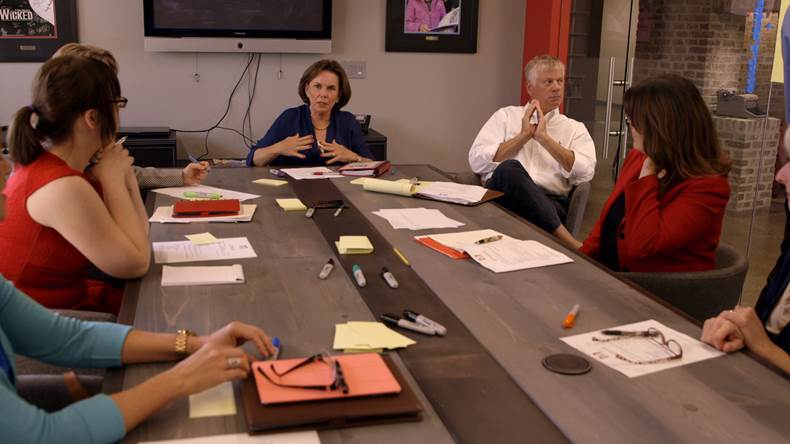
Mac, a former nurse who shares his passion for the arts, watched Russ take his first steps with Quadna and learned from him what effective entrepreneurial, risk-taking looks like. They walk closely together now, practically joined at the hip, in his encore career with Act One.
“Russ has big picture vision, business strategy, and financial wisdom—and I enjoy creating partnerships and connections for Act One,” Mac said. Their combined strengths and shared commitment are a powerful force for change in the lives of tens of thousands of students.
Quadna employees also bought in to Perlich’s personal and corporate philosophy of giving back to the community. It wasn’t enough to donate money to charities. They were encouraged to give time and talent. Perlich led by example through his volunteer work, which included assisting in establishing First Tee of Tucson, a youth development program that was as much about teaching life skills as it was about golf mechanics.
“Russ has big picture vision, business strategy, and financial wisdom—and I enjoy creating partnerships and connections for Act One”
–Mac Perlich, Act One
After relocating Quadna to Phoenix in 2000, Perlich and his employees decided to focus their attention on a nearby middle school in the Roosevelt Elementary School District. The relationship evolved and grew. A school adoption would become a groundbreaking Teach for America corporate sponsorship. That led, among other things, to Quadna doing everything necessary to take about 800 students at Percy L. Julian School on a field trip to see “Henry V” at Herberger Theater.
When Perlich retired in 2010 from his for-profit business career, he pursued his plan to do nothing but golf. That lasted only a few months.
He served four months as interim executive director of Ballet Arizona, an experience that deepened his understanding of nonprofit business culture. The unusual degree of commitment and passion was something he didn’t see in the for-profit world. He liked it enough to want to do more.
Act One is the story of Perlich’s life—an encore production. The nonprofit is a reflection of everything that made him a successful businessman and philanthropist, and it is a testament to his desire to help ensure all children get a fair shake.
Marc Freedman, founder and CEO of San Francisco-based Encore.org, said Perlich is part of a pioneering group of millions of Americans who are in the midst of encore careers that are at the “intersection of passion purpose and a paycheck.” These people just aren’t passing through; they’re taking a stand and making a commitment to solve a significant problem, he said.
“With extended life and health, so many people have the opportunity not just to leave a legacy but to actually live one, and that’s clearly what Russ is doing,” Freedman said.
How is an Act One encore career like a Quadna career?
“It’s exactly the same,” Perlich said. “We designed something, we built it and we sold it and we got paid for it. And we did it in collaboration with a number of partners. “It’s what we’re doing here (with Act One).
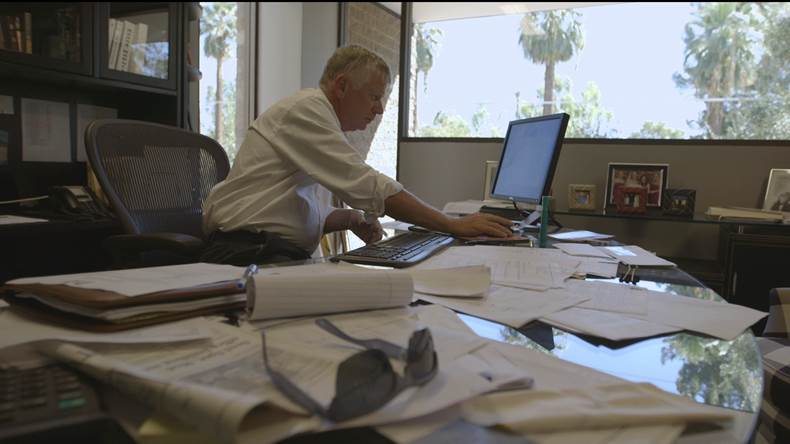
“The customer is different. The customer is the student and the Title I school. The product that we hopefully are selling is creativity; that they walk out and wonder why and how. We’ve got partners; can’t do it without them. And the payment is in what you see going out the door as compared to what you see going in the door.”
By the end of the 2015-16 school year, Act One expects to serve more than 100,000 students through its field trip program. It’s reaching capacity, the point where there’s more demand than supply. Students may be turned away. That’s another reality for Act One to change.
Perlich’s understanding of capacity and his analysis of the arts and culture sector of the nonprofit world, tell him there’s also an opportunity at hand for sustainable growth and development for Act One. It will require partnerships and collaboration, not unlike the effective relationships Quadna built to carry out its business plan. It may require evolving, as Act One did in 2013 when it took stewardship of Culture Pass, a statewide program that provides library cardholders free tickets to events.
Perlich sees Act One’s programs as a way to serve children and their families and also help chronically struggling arts organizations with much-needed audience building.
“Russ had a great career,” Jennings-Roggensack said, “and instead of resting on his laurels, he really said, ‘How do I help where I live be a better place—for everyone?’ ”
Colleen Jennings-Roggensack, executive director for Arizona State University (ASU) Gammage and associate vice president cultural affairs for ASU, said students who benefit from Act One become part of, not excluded from, the equation for building the cultural life of our cities.
“Russ had a great career,” Jennings-Roggensack said, “and instead of resting on his laurels, he really said, ‘How do I help where I live be a better place—for everyone?’ ”
Act One is a custom-made, innovative solution to a clearly identified need. It follows a well thought-out business plan executed by people invested in its purpose.
And on many school days in Arizona performance halls, Act One is a symphony in motion. All the planning and collaboration that begins long before the start of a school year moves together in a thoughtfully choreographed, well-rehearsed production.
Fifteen minutes before Childsplay’s version of “Sideways Stories From Wayside School” at the Tempe Center for the Arts, the theater is filling with K-6 students bused from throughout the Phoenix area.
“Bottoms on seats. Feet on the floor,” a chaperone reminds her charges.
No problem. As soon as the students walked into the center, they respected the special space with its floor-to-ceiling windows two stories high, the infinity pool that seems to flow into Tempe Town Lake, the shiny brass railings, the artistic wood panels and the glass-sided walkway overhead leading to the balcony.
Nailing the “Wow”: Check
The set on stage sparks conversation among some students. Others swayed to “Roar,” Katy Perry’s pop anthem piped in softly. But there is no roaring now, just a respectful buzz until the house lights dimmed and then quiet.
Russ and Mac are seated in a prime spot to see both the performance and the audience. They often attend Act One field trips. There are 36 events currently on the calendar for this school year. More performances likely will be added.
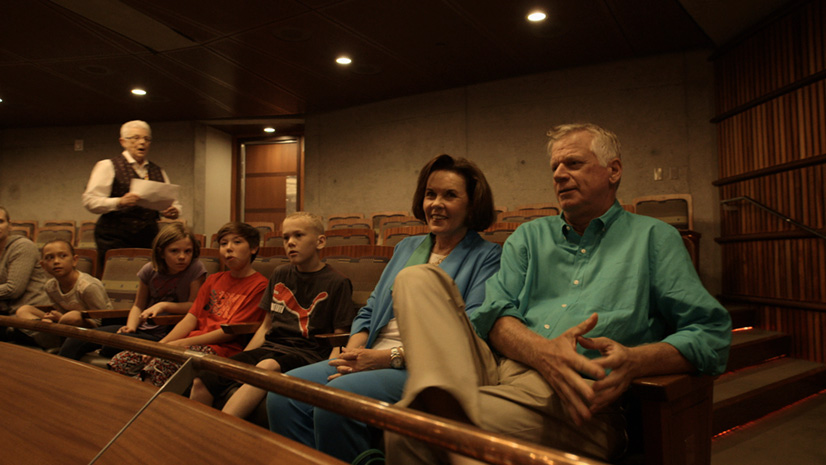
For 90 minutes, Childsplay took kids to another place on a journey that made them laugh and gasp. At the end, there were a few questions for cast members from the audience. How? Why?
And maybe unspoken but deeply planted, “What if …”
$50,000 Encore Career Prize, 2013
“He was a key figure in getting the campus built in the first place. An essential force in coordinating the various agencies once it opened. Its first managing director—at a salary of $1 month. And a leader now in the drive to end chronic homelessness within the next few years.”
– Doug Parker, CEO, American Airlines Group
By Kathleen Ingley
A man was recently sweeping the outside steps of a building at the Human Services Campus in Phoenix. The site is home to more than a dozen agencies serving Maricopa County’s homeless men and women. With a big meeting scheduled, it was no surprise to see someone tidying up.
What was startling was the person wielding the broom: Mike McQuaid, president of the board of directors for the campus.
He was a key figure in getting the campus built in the first place. An essential force in coordinating the various agencies once it opened. Its first managing director—at a salary of $1 month. And a leader now in the drive to end chronic homelessness within the next few years.
One of the campus outreach workers snapped a picture of McQuaid sweeping that day. He wanted to capture a moment that says so much about “the most amazing man I have ever talked to,” the man who helped turn his life around. He was staying in the men’s overflow shelter, just out of prison where he’d recovered from drug addiction and alcoholism. McQuaid “was one of the main keys that made me believe in myself,” he said, choking up as he described the impact, “just to know that there is someone out there that cares.” Now, he has a job, a car, and housing. He’s attending community college with the goal of becoming an alcohol and dependency counselor.
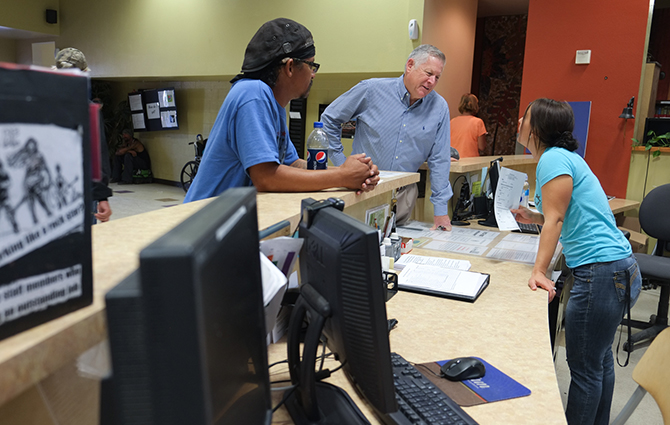
In the fight against homelessness, Mike McQuaid has shown for years that he’ll do whatever it takes.
He started off volunteering at a soup kitchen almost three decades ago and went on to make the issue a second job.
He’s motivated every time he walks around the Human Services Campus, “seeing people that I know would not be getting help if the campus weren’t here—they’d be wandering the street.”
“I’ll always be involved with my private business. But I have made working for issues regarding homelessness kind of a side-by-side career.”
–Mike McQuaid
As baby boomers approach retirement age, more and more are looking for an “encore career”—meaningful work that uses their skills. Many are choosing social service, from education to healthcare.
The trend could explode the notion that an aging population will put a crushing burden on America. Instead, seniors can revitalize communities and bolster the lives of the disadvantaged, Marc Freedman, founder of Encore.org, asserts in his book, “Encore: Finding Work That Matters in the Second Half of Life.”
For McQuaid, a 68-year-old commercial real estate developer, helping the homeless is an encore and also a parallel.
“I’ll always be involved with my private business,” he explained. “But I have made working for issues regarding homelessness kind of a side-by-side career.”
McQuaid graduated from Arizona State University with a degree in business management. After starting off in the insurance business, he and a partner moved into commercial real estate. They specialize in developing corner shopping centers, anchored by a major supermarket, near housing developments and master-planned communities.
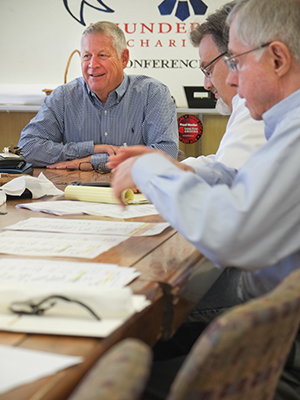
McQuaid took the first steps on the path to his second career nearly 30 years ago. His sons needed to do community service as part of a church project. Through a friend, he heard about André House of Hospitality, a project started by two Catholic priests who cooked food in their backyard and served dinner to the homeless in a nearby park or vacant lot.
The plight of the homeless went straight to his heart. “I couldn’t believe there were individuals by themselves, on the street with nothing,” he said. It was a shock to someone who came from a close-knit family that offered a substantial support system.
McQuaid began volunteering once, then twice a week. His wife, Molly, joined him.
Then André House started looking for a building to serve meals, instead of out in the open. With his business experience, McQuaid was asked to lend a hand in finding a building, and then he helped structure the deal and get everything set up. He became the first chairman of the board of directors for André House.
In 1997, the McQuaids went a step further and founded Helping Hands Housing, along with two other couples who volunteered at André House. The nonprofit, dedicated to providing housing for homeless and working-poor families, merged in 2009 with United Methodist Outreach Ministries.
“It was just good timing,” is McQuaid’s self-deprecating explanation. His business allowed him some flexibility. He’d always coached his sons in Little League and other sports. But they were growing up, and he was looking for some other kind of public service.
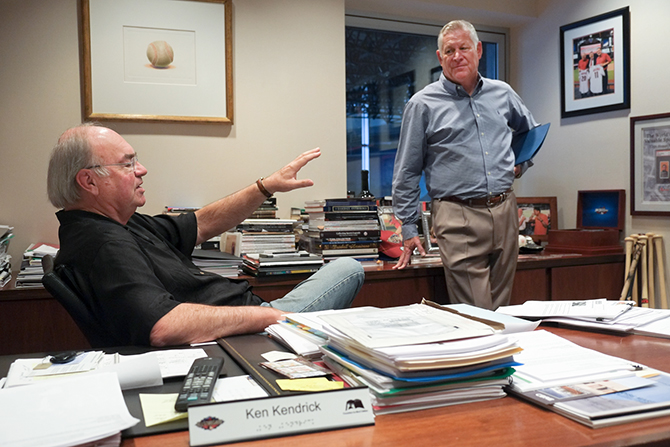
The volunteering morphed into a job of its own around 2000.
At that time, McQuaid said, “I really started to look at the bigger picture beyond just what André House did.” Wasn’t there a way to create a kind of one-stop shopping for the homeless, so they didn’t have to go to a different place for food, shelter, healthcare and other services?
“I’m very involved in sports and I’ve always enjoyed being the coach, the one to bring people together in a team. That’s been my focus in my personal business: How do we bring the right group of investors together, who can leave their egos at the door?”
–Mike McQuaid
Other nonprofit executives and local leaders were wondering the same thing—especially since two major organizations, St. Vincent de Paul and Central Arizona Shelter Services, were operating out of dilapidated and inadequate facilities. They came up with a proposal for a campus that would house various services.
McQuaid became the first managing director of the new Human Services Campus, with a “salary,” as someone jokingly suggested at a meeting, of a dollar a month.
He spent two years overseeing construction of the $24 million campus on 10 acres at 12th Avenue and Jackson Street in downtown Phoenix. Funding came from a mix of private and public sources, particularly Maricopa County. More than 1,000 individuals a day now use its services.
The “anchor tenants” are Central Arizona Shelter Services with shelter and case management; the Society of St. Vincent de Paul with a dining room serving breakfast and lunch, a chapel and meeting-room facilities; St. Joseph the Worker, offering employment services; Nova Safe Haven, serving the seriously mentally ill; and Maricopa County Healthcare for the Homeless. André House is just next door.
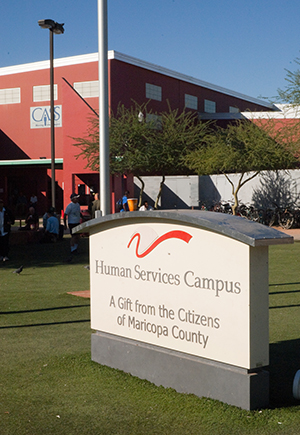
The campus also led to the development of the Lodestar Day Resource Center, a cooperative effort that puts more than a dozen additional services under one roof.
When it opened in November 2005, the campus was hailed as national model of coordinating services for the homeless.
But the various agencies themselves had little experience working together. Besides meshing case-management systems, they had to figure out practical tasks like picking up trash and handling security, said David Smith, Maricopa County manager at the time. (Now retired, he’s gone on to his own encore career in the field, as chief operations officer for St. Vincent de Paul.)
McQuaid took on the challenge of getting all the parts to work together.
“His personality played very well in that initial chaos,” recalled Kris Volcheck, founder and director of the dental clinic. “His demeanor was very calming. He had a very settling effect on everybody. You felt that Mike had everything under control.”
Indeed, bringing people together is one of McQuaid’s professional strengths.
“I’m very involved in sports,” he said, “and I’ve always enjoyed being the coach, the one to bring people together in a team. That’s been my focus in my personal business: How do we bring the right group of investors together, who can leave their egos at the door?”
McQuaid has a level of commitment that most people reserve for a full-time job. “People come and do something for the month or for Thanksgiving or hand out presents on Christmas Day,” said Mark Holleran, CEO of Central Arizona Shelter Services. “Then they disappear for the other 364 days. Mike’s there all the time and has been there, year in, year out, year in, year out.”

“His demeanor was very calming. He had a very settling effect on everybody. You felt that Mike had everything under control.”
–Dr. Kris Volcheck, Director, CASS Dental Clinic
McQuaid managed the campus from 2003 to 2010. Now, besides serving as president of its board of directors, he’s treasurer of the Lodestar Day Resource Center.
McQuaid knows how to frame the issue of homelessness for his audience, answering the concerns of Democrats and Republicans, conservatives and liberals. He talks about public health, public safety, the right thing to do.
“There are people in the private sector who wouldn’t pay attention to this issue without Mike,” Holleran said. “The ones I’ve met become believers because of him.”
McQuaid’s own dedication and track record draw others in.
After Tom Manos retired as Gov. Jan Brewer’s deputy chief staff for finance and budget in 2009, McQuaid asked him to lend a hand with some governance issues at the Human Services Campus. After a career at large public entities, where results take years, Manos loved the immediate impact of working at the campus: “You could see people’s lives changed every day.”
He quickly became a regular, even coming Saturdays, and stayed on until he was named Maricopa County manager in 2012.
Linda Mushkatel, special projects manager at Maricopa County, worked on the original capital campaign for the Human Services Campus. She admires how McQuaid avoids micromanaging, “allowing people to grow and be innovative.”
“No one would ever want to let Mike down,” she said, “because he’s so committed on a personal level and on a policy level.”
His example is one reason she decided to follow up her retirement at the end of this year with an Encore Fellowship at the campus. The program, run by the nonprofit, Experience Matters, places professionals in nonprofit organizations half-time for 12 months, is sponsored by the Arizona Community Foundation, BHHS Legacy Foundation, the Bruce T. Halle Family Foundation, the Lodestar Foundation, PetSmart Charities, and Virginia G. Piper Charitable Trust.
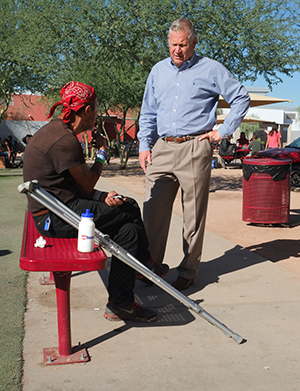
McQuaid pulled in his accountant when some tax issues came up at Lodestar. Jeff McMullin didn’t hesitate to volunteer his skills: “You know that you’re following a leader that is doing things out of pure charity for others.”
McMullin ended up on Lodestar’s board of directors. He remembers getting a proposal to spend $10,000 to start a ballroom dance program at Lodestar. As a numbers cruncher, he was shaking his head no. But McQuaid told him to be patient. It would all work out. And it did. The innovative program turned out to be a rousing success, giving homeless participants a sense of dignity, confidence, structure and, no small thing in their hard lives, joy.
Nonprofits can’t survive in today’s world just by pulling on heartstrings. They need the same kind of solid business plan as, say, a commercial real estate deal. That’s where McQuaid excels.
He’s “a brilliant businessman,” said Shelby Scharbach, executive director of the Industrial Development Authority of Maricopa County. “He’s able to tell you what your results and outcomes will be: It’s tangible.”
The authority recently approved a $1 million grant request from the Human Services Campus for two projects: housing homeless veterans and building a new welcome center.
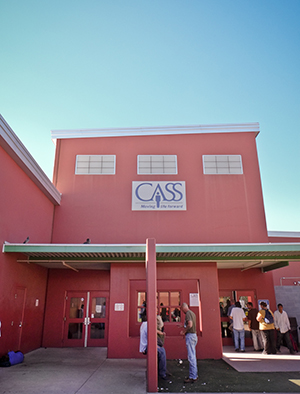
Everything hasn’t always been on track. McQuaid sees two major shortcomings: the entryway to the Human Services Campus and the persistence of chronic homelessness. And now he’s working on both projects.
The Human Services Campus was designed without a central facility at the entrance. “We just literally opened up that big old gate,” he said, and people came in, scattering to various agencies. The physical layout didn’t encourage a unified management for each person’s issues.
Thanks to funding from the Industrial Authority and an anonymous donor, the campus will be re-oriented, and everyone will come through the new Brian Garcia Welcome Center. That will create a single processing point, where people’s needs are assessed immediately, and they can be matched up with appropriate services, including housing.
McQuaid’s other priority is getting the chronically homeless off the streets. These are people who have been homeless for at least a year or four times in the past three years. Many are struggling with substance abuse and mental-health problems.
“They consume two-thirds of our resources,” he said, “and are only about 15 percent of our population (of homeless individuals).”
The common wisdom used to be that housing should come last for these people, after dealing with their underlying problems.
That turns out to be upside down: Housing has to come first. “You can’t get clean and sober and mentally stable if you’re on the streets or you’re in the shelter,” McQuaid said.
“No one would ever want to let Mike down because he’s so committed on a personal level and on a policy level.”
—Linda Mushkatel, Special Projects Manager, Maricopa County
During the economic downturn, McQuaid used his real estate skills to help nonprofits acquire multifamily sites and turn them into “supportive” housing, which includes services on site.
Now he and Doug Parker, chairman and CEO of US Airways, are co-chairs of Valley of the Sun United Way’s Ending Homelessness Advisory Council.
McQuaid has kept such a low profile in his volunteering, working without seeking credit, that Parker hadn’t heard of him until they served together on the council.
“He’s earned the right to be off and enjoying retirement, and he’s choosing to take the time to help people less fortunate,” Parker said. “I tell him he’s my hero, and he thinks I’m joking. But I’m serious. You just wish there were more people like him.”
A lot of people say they want to serve the community when they finish working. McQuaid, Parker said, is “an inspiration and an example to show that it can be done.”
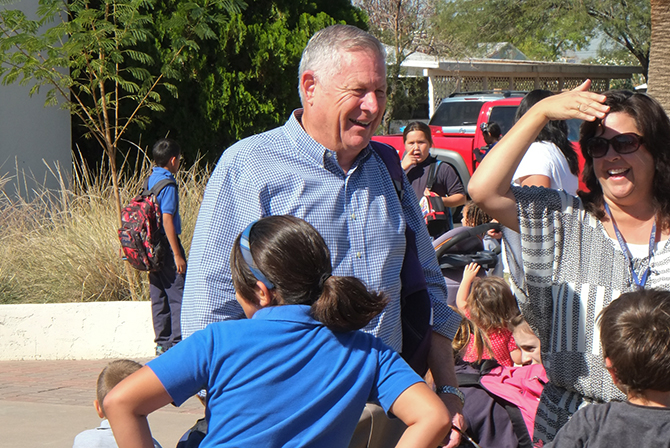
McQuaid has also been a driver in making the economic case for helping the chronically homeless, Parker said. The community saves money when people aren’t on the street, dialing 911 for medical emergencies or getting picked up on petty criminal charges.
The goal is amazingly close. By 2015, every chronically homeless veteran should be in supportive housing. Shortly afterwards, so should the entire population of chronically homeless men and women. (Homeless families are served by agencies outside the Human Services Campus, and the housing solutions for them, which are more complicated, will take longer.)
Without the pressure of chronic cases, the campus will change its focus, concentrating on those who are newly homeless, who might be able to get back into housing with help making a utility deposit or finding a job.
Mike and Molly McQuaid have two sons and nine grandchildren. Their commitment to others plays out in their personal life. They’ve become close friends with a family that has struggled over the years, and one of the children stays with them during the school week. McQuaid takes the 10-year-old to and from St. Gregory Catholic School every day.
The family has started a small foundation, which focuses on helping needy students get a Catholic education and assisting the homeless.
In his second career tackling homelessness, McQuaid’s impact is summed up this way by someone who used to be homeless: “He’s a miracle man.”
McQuaid is starting to look ahead as the major projects he’s involved in get close to completion. “I’ll be 70 in a year and a half and finally maybe fulfill my pledge to my wife that this is my last year,” he said.
When the chronically homeless are housed and the welcome center is up and running, he said, “I want to devote some of my time and energy to something different.”
He’d like a teaching role that lets him share his experience with others. It could be another encore career.
OP ED-THE ARIZONA REPUBLIC
VALLEY’S BABY BOOMERS ARE 24-CARAT GOLD TO NON-PROFITS
By Judy Jolley Mohraz and Nora Hannah
Sun Nov 10, 2013 6:11 PM
From The Arizona Republic | AZCentral.com, Opinions, Nov 10, 2013
Legends of an untapped gold mine float through Arizona history. We have found that treasure — and it isn’t the Lost Dutchman’s Gold Mine nestled in the Superstition Mountains. The gold is in the 1.1 million Baby Boomers living in Maricopa County.
These folks age 50 and older have education, experience, and a passion to solve hard community problems. They know they have decades longer to live in better health than any generation in history. And they don’t want to “retire” their talents. They are ready for the next stage of life and many want an encore career that builds a new non-profit or helps an agency tackle tough challenges.
Their work and wisdom are like a vein of gold for Maricopa County. Here’s an example:
Mike McQuaid, the first Piper Trust Encore Career Prize Awardee, is determined to end chronic homelessness in Maricopa County. In his first career, he was a successful real-estate developer who found time to volunteer with his family to serve meals to the homeless. But he knew services needed to be better coordinated, not spread throughout the community. He led the effort to build and manage the Human Services Campus that houses more than 20 agencies serving homeless people. Using his business expertise, he worked with elected officials, the county manager and community leaders to raise the money for as well as plan and build the Campus, the first in the nation and a national model. Today, it serves more than 1,000 people every day.
CHANNEL EIGHT/ARIZONA HORIZON INTERVIEW
PIPER CHARITABLE TRUST ENCORE CAREER PRIZE
Host: Ted Simons
Thu Nov 07, 2013
Arizona Horizon | AZPBS.org
The Virginia G. Piper Charitable Trust will honor an inspiring encore career leader who is addressing a major social need in Maricopa County with a second career. We will talk Mike McQuaid, winner of the inaugural Piper Trust Encore Career Prize.